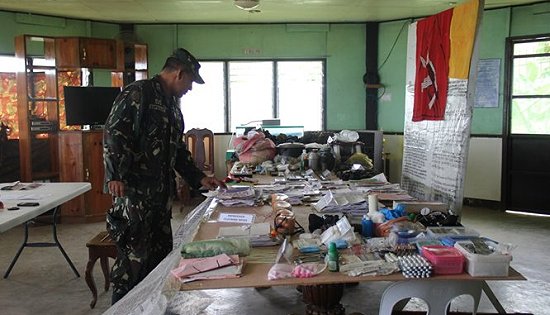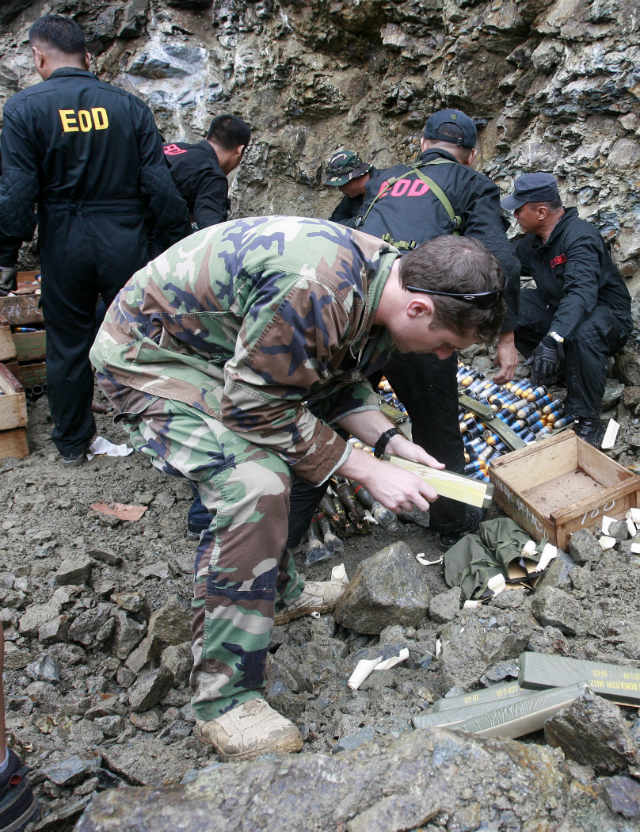From the Associated Press (Jun 26):
APNewsBreak: US ends Philippines anti-terror force
After more than a decade of helping fight Islamic militants, the United States is disbanding an anti-terror contingent of hundreds of elite American troops in the southern Philippines where armed groups such as Abu Sayyaf have largely been crippled, officials said Thursday.
But special forces from the U.S. Pacific Command, possibly in smaller numbers, will remain after the deactivation of the Joint Special Operations Task Force Philippines (JSOTF-P), to ensure al-Qaida offshoots such as Abu Sayyaf and the Indonesia-based Jemaah Islamiyah do not regain lost ground, according to U.S. and Philippine officials.
The move marks a new chapter in the long-running battle against an al-Qaida-inspired movement in the southern Philippines, viewed by the U.S. as a key front in the global effort to keep terrorists at bay. It reflects shifting security strategies and focus in economically vibrant Asia, where new concerns such as multiple territorial conflicts involving China have alarmed Washington's allies entangled in the disputes.
A year after the Sept. 11, 2001, terrorist attacks, the U.S. military established the task force in the southern Philippines to help ill-equipped Filipino forces contain a bloody rampage by Abu Sayyaf gunmen, who carried out bombings, terrorized entire towns and kidnapped more than 100 people, including three Americans.
Although U.S. forces are barred by the Philippine Constitution from engaging in combat, the advice, training, military equipment and intelligence, including drone surveillance, that they provided helped the underfunded Philippine military beat back the Abu Sayyaf. U.S.-backed Philippine offensives whittled the militants' ranks from a few thousand fighters - mostly drawn from desperately poor hinterland villages - to about 300 gunmen, who survive on extortion and kidnappings for ransom while dodging military assaults.
"Our partnership with the Philippine security forces has been successful in drastically reducing the capabilities of domestic and transnational terrorist groups in the Philippines," U.S. Embassy Press Attache Kurt Hoyer said in a written response to questions sent by email by The Associated Press.
The remaining terrorists, he said, "have largely devolved into disorganized groups resorting to criminal undertakings to sustain their activities."
That success has led U.S. military planners in coordination with their Philippine counterparts "to begin working on a transition plan where the JSOTF-P as a task force will no longer exist," Hoyer said, adding there were currently about 320 American military personnel left in the south.
Before the drawdown, about 500 to 600 Americans had been deployed there.
Hoyer said a still-unspecified number of U.S. military personnel would remain under a new unit called the PACOM Augmentation Team to provide Filipino forces with counterterrorism and combat training and advice, and "ensure that violent extremist organizations don't regain a foothold in the southern Philippines."
He suggested the remaining American staff would move away from training exercises to working with Philippine security forces at unified commands and headquarters units.
The timing of such withdrawals from counterterrorism campaigns from the southern Philippines to Afghanistan has been a dilemma for the U.S., which must ensure that remaining extremist forces are not able to bounce back.
While Abu Sayyaf attacks have considerably gone down, ransom kidnappings have increased, with some militants even crossing into neighboring Malaysia to snatch tourists.
Defense Secretary Voltaire Gazmin said Philippine officials have been notified of the U.S. move and expressed confidence that Filipino forces could deal with any lingering threat in the south, scene of a decades-long Muslim separatist rebellion in the predominantly Roman Catholic nation.
Gazmin said that with the scaling down of the U.S. presence in the south, the Americans would renew a presence elsewhere in the country to help address another security concern - China's increasingly assertive behavior in the disputed South China Sea, where Beijing, Manila and four other governments have been locked in increasingly tense territorial disputes.
"It's like they never left," he said.
After closing down military bases in the Philippines in 1991, the U.S. signed a 10-year pact in April with Manila, a defense treaty ally, that will allow possibly thousands of American forces temporary access to selected military camps and enable them to preposition fighter jets and ships.
The Philippines' efforts to protect its territory have dovetailed with Washington's aim to pivot away from years of heavy military engagement in the Middle East to Asia, partly as a counterweight to China's rising clout.












